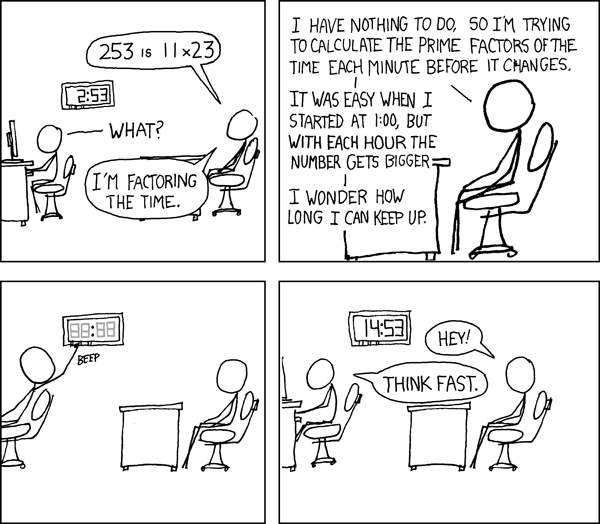Jane glanced up at the clock and noticed that when the second hand was on the 12, the three clock hands divided up the clock into a right, acute and obtuse angle. What time was it:When grading, many students ignored the idea of the hour hand moving in between, so I evaluated based on their assumptions. In general on the test, I was trying to create the possibility of seeing some problem solving, where they could demonstrate understanding of ideas without necessarily having to get a right answer. It was partially successful.
Remember the hour hand moves during the hour.
- 3:30,
- 5: 43,
- 1:22,
- 9:15,
- more than one possibility or
- none of those
As I was trying to write the problem, I posed myself this question:
If it is y o'clock and x minutes past the hour, what is the angle formed by the clock hands?If you're considering either, I'd love to hear what you think in the comments. How do you evaluate the first? In the second, would you expect the equation to be linear? Why?
Cartoon from xkcd, of course.
 Some of the exam problems were pretty open-ended, like:
Some of the exam problems were pretty open-ended, like:1. Find an L-shaped figure with an area of 84 sq.cm and a perimeter of 44 cm. Is there more than one?And some were more closed, but hopefully with multiple ways to do them.
2. What kind of triangles can be made by connecting vertices on a regular octagon? Specify the side-angle type. Did you find all of the types?
5. Sort the quadrilaterals into two overlapping Venn diagram circles: one for rotational symmetry, one for reflectional symmetry. Quadrilaterals that don’t fit either should go outside.Nobody made a joke. How many kisses in a bar? Come on!
6. A Hershey’s chocolate bar is 43 g. A kiss is 4.56g. You remember that 1 pound is 454g and 1 pound is 16 oz. How many ounces is a Hershey bar? A Hershey kiss? How many kisses in a bar? (Make a joke if you want.)

No comments:
Post a Comment